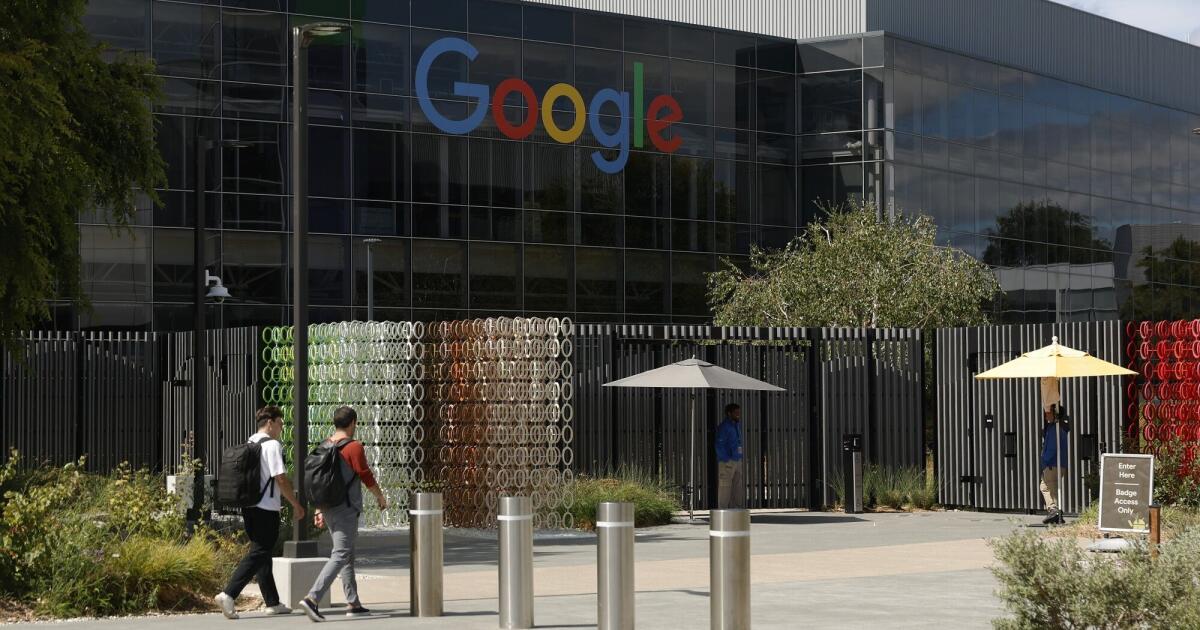
The Justice Department last week sought to persuade a federal judge in Virginia to force Alphabet Inc.’s Google to sell off part of the company and change the way it does business to improve competition for online display advertising.
Google runs an ad-buying service for marketers and an ad-selling one for publishers, as well as a trading exchange where both sides complete transactions in lightning-fast auctions. Judge Leonie Brinkema ruled earlier this year that the search giant illegally monopolized two of those markets — the exchange and ad-selling technology, known as an ad server. She’s now considering how to remedy the illegal conduct in what’s expected to be a two-week hearing.
After questioning 12 witnesses, the Justice Department is poised to rest its case on Friday. Google is then expected to spend the next several days presenting witnesses who it says will show the Justice Department’s requests are “radical and reckless” and would break technology underlying billions of dollars in online ads.
Brinkema, an 81-year-old who joined the bench in 1993, has homed in on technical aspects of the Justice Department’s demands.
“Where your time should be spent is on the experts,” Brinkema told lawyers near the end of the second day, saying that much of what she had heard so far was “window dressing.” “I’m very interested in seeing the evidence of what Google thinks is technically possible. That’s the heart of the evidence that I’m interested in hearing.”
Here’s what the government is proposing:
Sell the AdX exchange
The Justice Department’s biggest request — one that has garnered the most air time at the hearing — relates to its push to force Google to sell off its advertising exchange, AdX. The exchange, which controls about 56% of the market, helps connect buyers and sellers in rapid-fire auctions.
Forcing Google to sell AdX would be “the single most important way to restore the trust of ad buyers,” said Jed Dederick, chief revenue officer at Trade Desk Inc., which runs an online platform for advertisers. Few advertisers are willing to invest in the online display industry because of Google’s conduct, he said, but if AdX were sold, “lots of advertisers and ad budgets would flow” into the market.
Jon Weissman, a computer science expert at the University of Minnesota, reviewed Google’s source code for the two ad tech products — which he called “beautiful to look at” — and said it was “technically feasible” for them to be separated and sold off to a new owner.
“I see no reason why the software would be degraded in any way,” he said Thursday.
Google, however, disputes Weissman’s assessment, saying that AdX and the ad server depend on services from other parts of the company that would be too difficult to partition. They plan to offer their own expert next week, Columbia’s Jason Nieh, who helped convince another court that forcing the sale of the Chrome web browser was too difficult.
Tim Craycroft, vice president and general manager for Google Advertising, testified that since 2020 the tech giant had conducted at least three internal assessments on the feasibility of changes to its ad tech business. Those included shutting down AdX completely, separating the buyside and sellside ad tools and moving part of the ad server onto Google’s cloud. The latest analysis came in 2024, when the company evaluated divesting AdX’s business to an outside buyer and making the ad server’s final auction logic open for the industry to use.
Craycroft argued the Justice Department’s divestiture remedy differed from what Google had contemplated in 2024 and would put a greater burden on the tech giant. The company contemplated a “business divestiture” of AdX that wouldn’t involve transferring technical assets or copying the source code, he said, but instead give the buyer an instruction manual on how to rebuild the offering. The Justice Department’s proposal would make Google responsible for helping rebuild the source code on a buyer’s infrastructure, Craycroft said.
It would take “years and years of work,” he said of the Justice Department’s proposed divestiture, which he called “naive, vague and incoherent in places.” He also called it “terrifying” that the Justice Department would have approval over the buyer of AdX.
Goranka Bjedov, an engineer who previously worked at both Google and Meta Platforms Inc., estimated that moving AdX from the company’s infrastructure to that of a new owner would take at most 18 months and require work from about 80 engineers. Bjedova, who testified on behalf of the government, said that her estimate was based on Google internal documents.
A lot of companies would likely be interested in purchasing AdX if it went up for sale, said Paul Crisci, an investment banker who formerly oversaw tech-focused deals at UBS Group AG.
AdX would be “attractive to a credible and motivated pool of buyers,” he said, including companies within the ad tech industry, as well as firms in technology, marketing or advertising. In fact, the chief executives of two ad tech firms who testified this week said they might be interested in buying the exchange if it goes up for sale: Andrew Casale, chief executive of rival Index Exchange, and James Avery, chief executive of Kevel, an ad server company that is working on building its own exchange.
Give web publishers more control
The Justice Department has recommended several changes to Google’s ad server business. An ad server acts as the brain of a website, helping organize the available space and keep track of sales. Antitrust enforcers recommended the company be required to build a tool that would make it easy for website publishers to transfer their data out of Google’s platform. At the trial last year, several website publishers testified that they felt trapped by Google since switching to a different ad server would require them to re-create their archives.
In addition, the Justice Department has proposed requiring Google to build another tool to make its ad server work with another popular ad tech tool called Prebid. That tool allows a publisher to host an auction within the browser that simultaneously seeks bids from multiple ad exchanges and picks the one that would pay the most.
Those changes would help “unshackle the ad server,” said Index Exchange’s Casale, and make it easier for other ad tech tools to compete with Google’s own.
In its own proposal, Google said it would integrate with Prebid. In his testimony, Craycroft said Google was “open” to the idea of making additional changes to the ad server.
“If the court thinks that’s important, we would,” he said.
Make ad auctions more transparent
The Justice Department’s other major proposal would require Google to make publicly available the final auction logic within the ad server that picks which ad is the ultimate winner. Advertisers would benefit from that kind of transparency, said Luke Lambert, who works for a division of Omnicom Corp.
“I would be able to understand why I win and why I lose,” he said.
Making that auction logic public would also help publishers. “We don’t know why the impressions land the way they do,” said Grant Whitmore, vice president of ad buying tools at Advance Local, part of the privately held media company owned by the Newhouse family. “It’s like a pachinko ball, we don’t know all the variables that are bouncing the ball around.”
Google has argued that making the auction logic public would increase the risk of cyberattacks. Craycroft said Google originally contemplated making public a “simple piece of software” that would outline how the ad server made its decisions. The Justice Department’s proposal, which he called “naively unrealistic,” would require Google to reveal the “heart” of the ad server.
Prosecutors have also asked Brinkema to bar Google from having its ad-buying tools give preferences to other products owned by the company.
Robin S. Lee, the Justice Department’s economic expert, said that Google Ads, the company’s popular ad network, sent 89% of its bids to Google’s own tools. Google Ads take over most of the decision-making process, including where to place ads and what to bid, and is most often used by smaller companies.
While Brinkema’s April opinion rejected the contention that Google Ads was also a monopoly, Lee argued that a remedy for the ad exchange and server markets needs to address that behavior as well. Otherwise, Google could simply arrange for Google Ads to send bids directly to the ad server, bypassing the exchange altogether, effectively creating the same monopoly problem.
During Lee’s testimony, Brinkema said that many witnesses assume that Google “would reattempt to monopolize.”
“If you had confidence that Google would actually act in complete good faith and follow an injunction,” she asked Lee, “would that then provide that the behavioral remedies would be sufficient?”
Companies will always pursue profits, he responded. So long as Google owns AdX and the ad server, it has the “incentive and ability” to pursue potentially problematic conduct, Lee said. Only a remedy that changes that incentive — such as a divestiture — is guaranteed to avoid the risk of reoffense, he said.
Google’s Craycroft also opposed the Justice Department’s proposals saying they would put the company at a “competitive disadvantage” compared to the rest of the industry.



